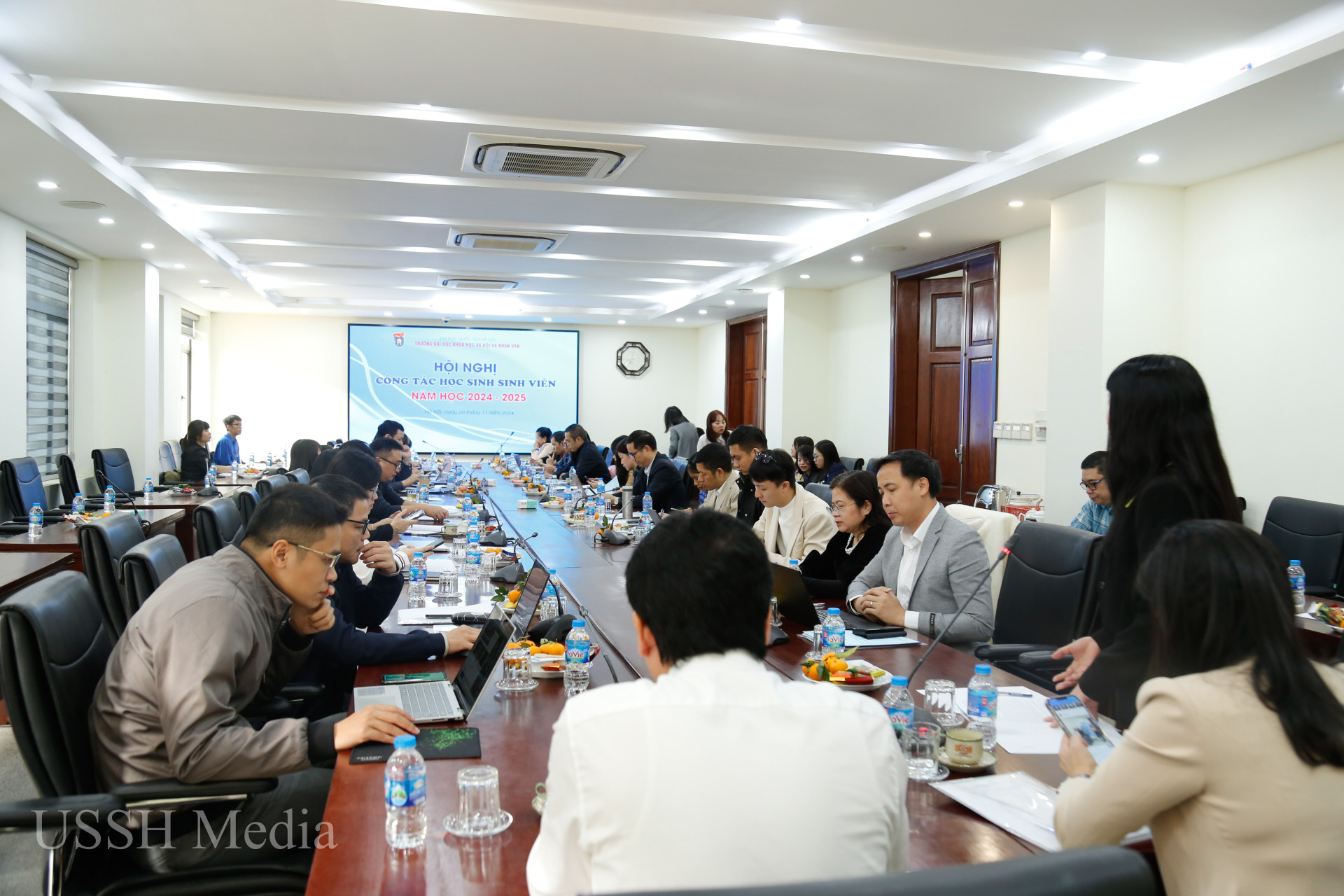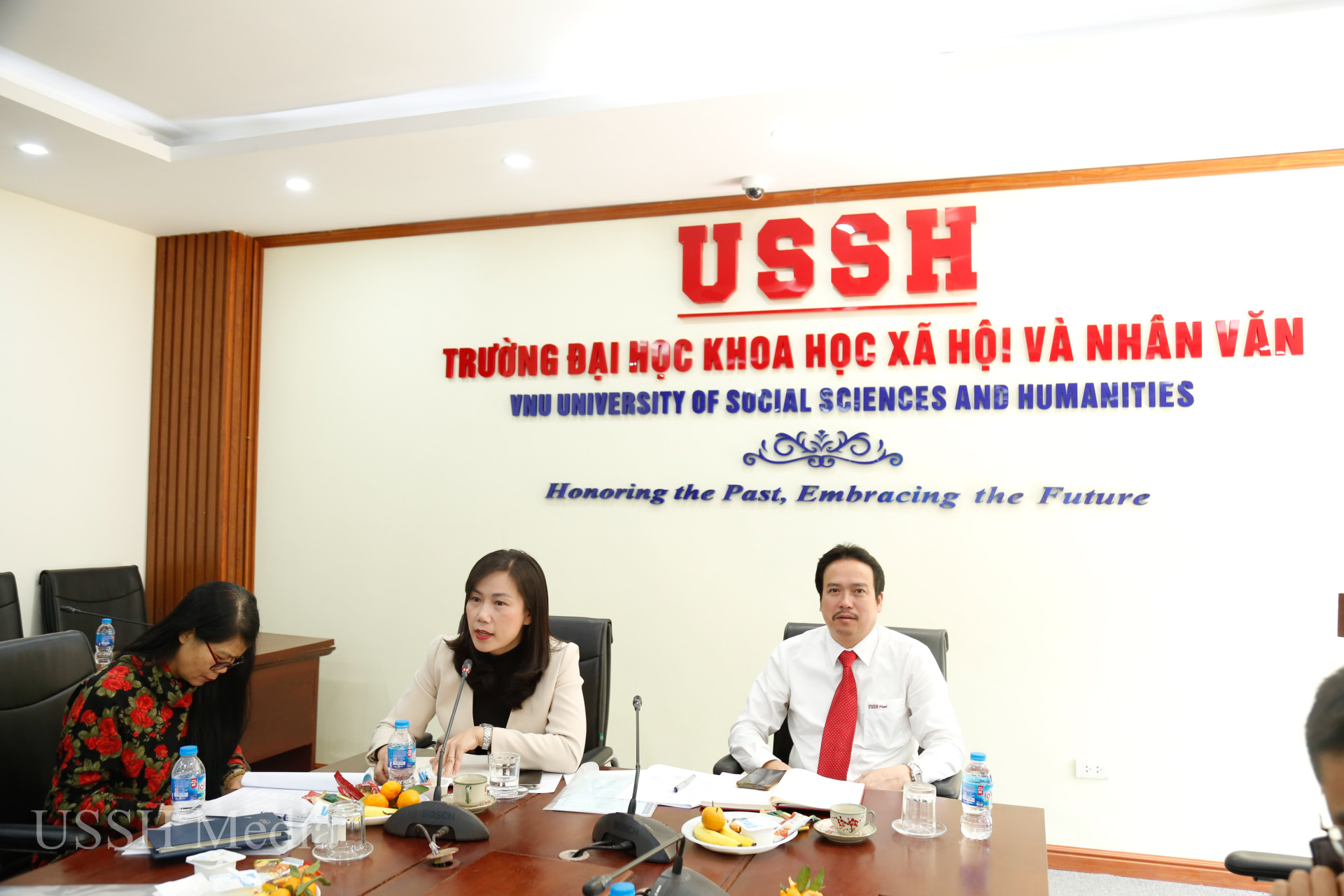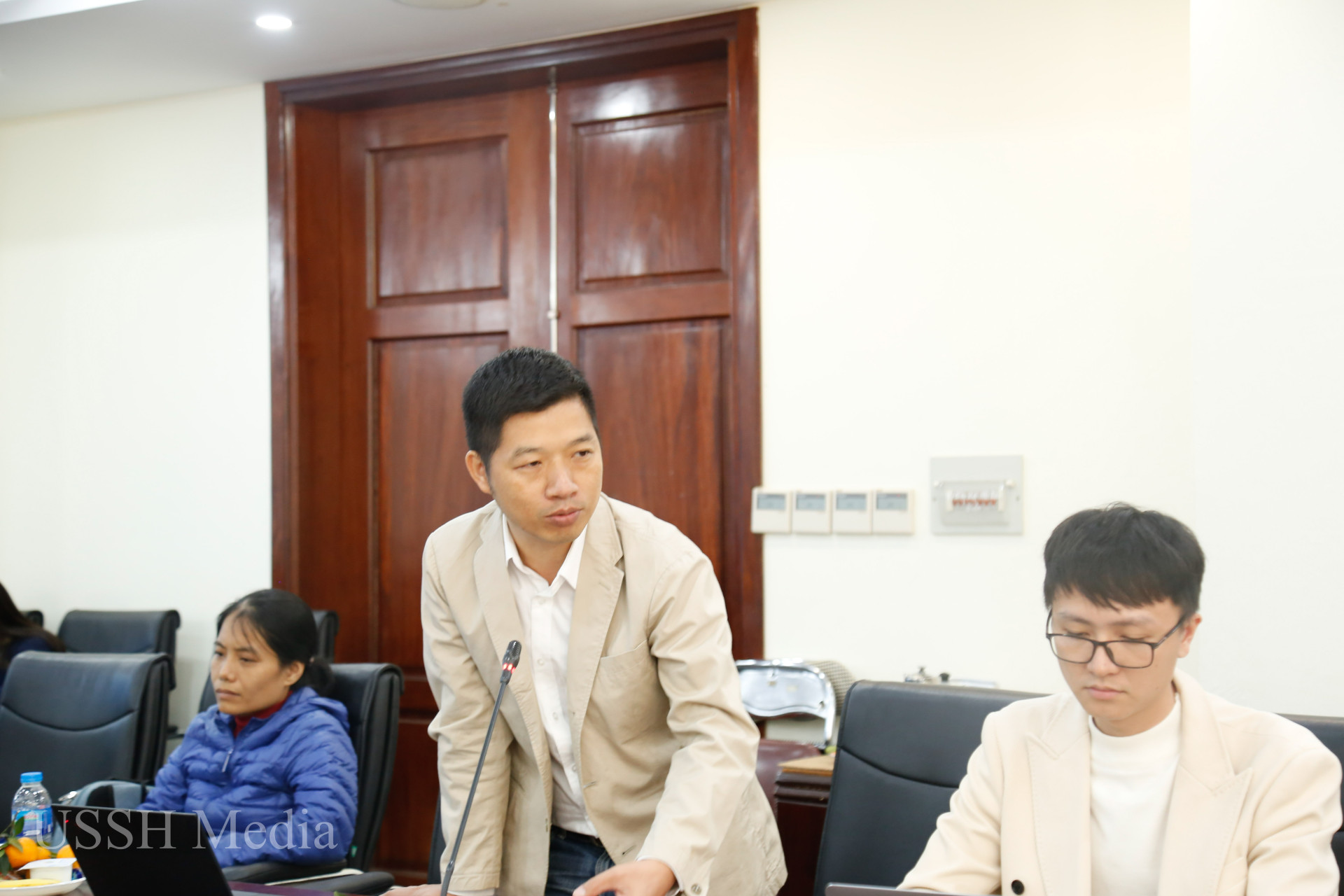The conference was attended and chaired by Assoc. Prof. Dr. Dang Thi Thu Huong (Vice Rector of the University), representatives of the leadership of functional departments/centers, and leaders and staff in charge of student affairs from all training units.
The Student Affairs Conference is an annual event aimed at evaluating the results of tasks performed during the academic year, setting directions for activities in the following academic year, and also serving as a forum for functional departments and training units to exchange and share concerns, difficulties, and lessons learned during the implementation of tasks, while proposing solutions to contribute to improving the quality of student care throughout the school.
In her opening remarks at the conference, Vice Rector Dang Thi Thu Huong shared: “During the past academic year, student care faced many difficulties and challenges: changes in university training regulations, limited facilities and campus space, and the rapid increase in student numbers. The students belong to Generation Z, which has many differences: they are proactive and confident, but demand higher levels of knowledge and quality of care, and have a greater need for self-affirmation. In addition, the constant changes in technology require all student management and care to be more creative, innovative, and modern. With the efforts, creativity, and dedication of the functional department staff, the cooperation of relevant units, and especially the active involvement of the leadership and student affairs assistants at the training units, student affairs in the 2023-2024 academic year achieved many remarkable results. The University leadership team We highly appreciate those efforts and contributions. However, the fiercely competitive environment in higher education today demands that student affairs work be reformed, improved in quality and effectiveness, contributing to affirming the university's brand and attracting high-quality students. Therefore, at this conference, the organizing unit hopes to hear frank opinions and specific suggestions from the leaders of the units and staff directly involved in this work.”
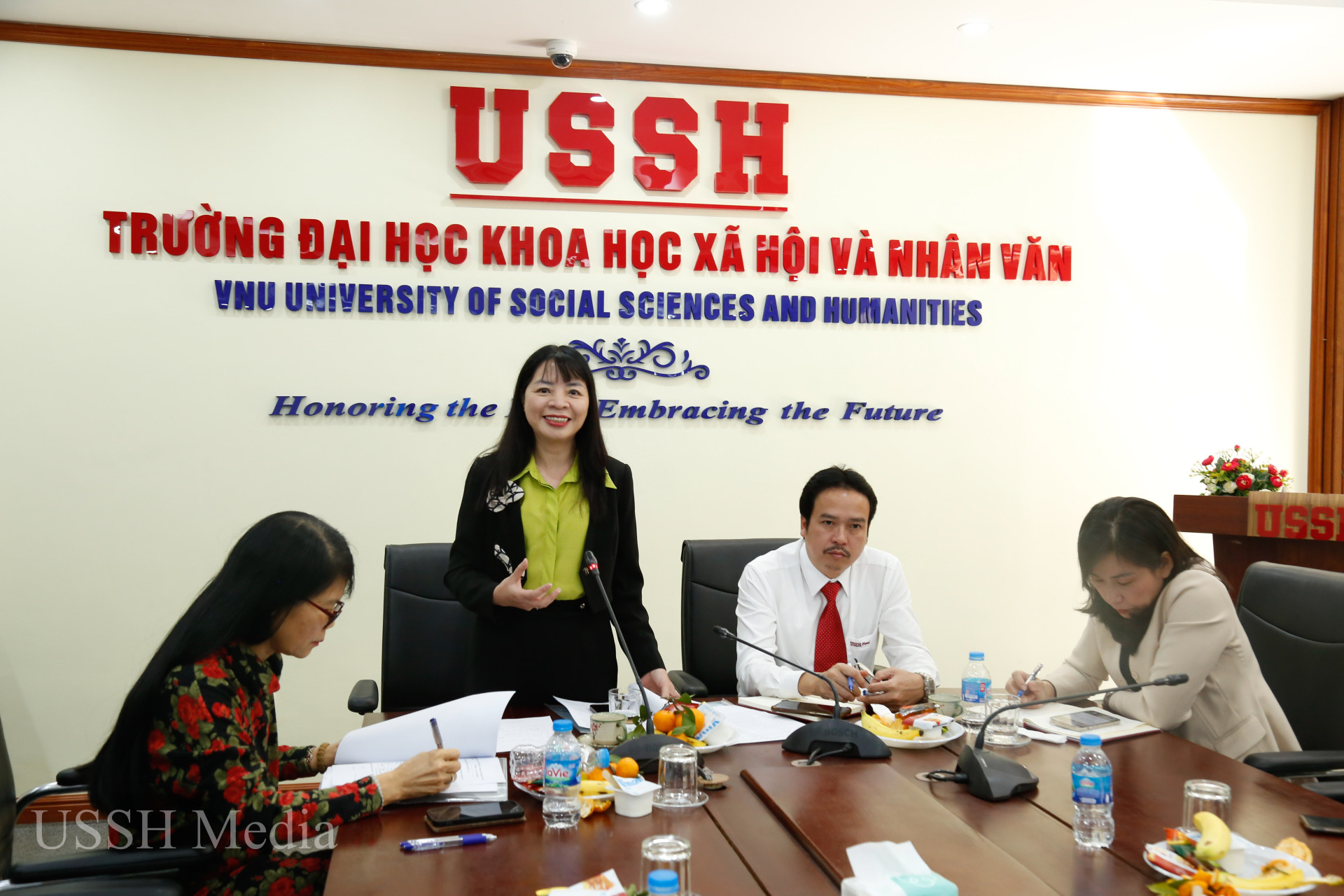
Vice Rector Dang Thi Thu Huong delivered a speech at the Student Affairs Conference for the 2024-2025 academic year.
Dr. Dinh Tien Hieu (Deputy Head of the Student Affairs and Student Support Department) and Dr. Nguyen Thi Tuyet Mai (Deputy Head of the Student Affairs and Student Support Department) chaired the conference.
At the conference, Dr. Dinh Tien Hieu (Deputy Head of the Student Affairs and Student Support Department) presented a summary report on the achievements and directions of political and student affairs work for the 2024-2025 academic year. The report highlighted several outstanding results: 99% of students achieved a good or excellent conduct rating, with no students violating the law or engaging in social vices; the timely and effective implementation of student rights regarding hardship allowances, tuition fee exemptions and reductions, and social assistance for policy beneficiaries and students in difficult circumstances; and the diversification of scholarship sources to encourage academic achievement and reward students with outstanding academic performance. In addition, the university organized numerous activities to care for students' physical and mental health; dozens of talk shows and career guidance seminars, equipping students with knowledge, skills, and psychological readiness to proactively and successfully enter the labor market immediately after graduation. Connecting employers and providing students with more job information is crucial. Student requests related to administrative procedures are handled quickly, promptly, and efficiently. Based on an analysis of existing shortcomings, the report proposes solutions to improve the effectiveness and quality of student support, focusing on: ensuring close coordination and connection between functional departments and training units; strengthening the application of information technology and digital transformation in administrative management; diversifying scholarship sources and academic incentives from domestic and international businesses and corporations, etc.
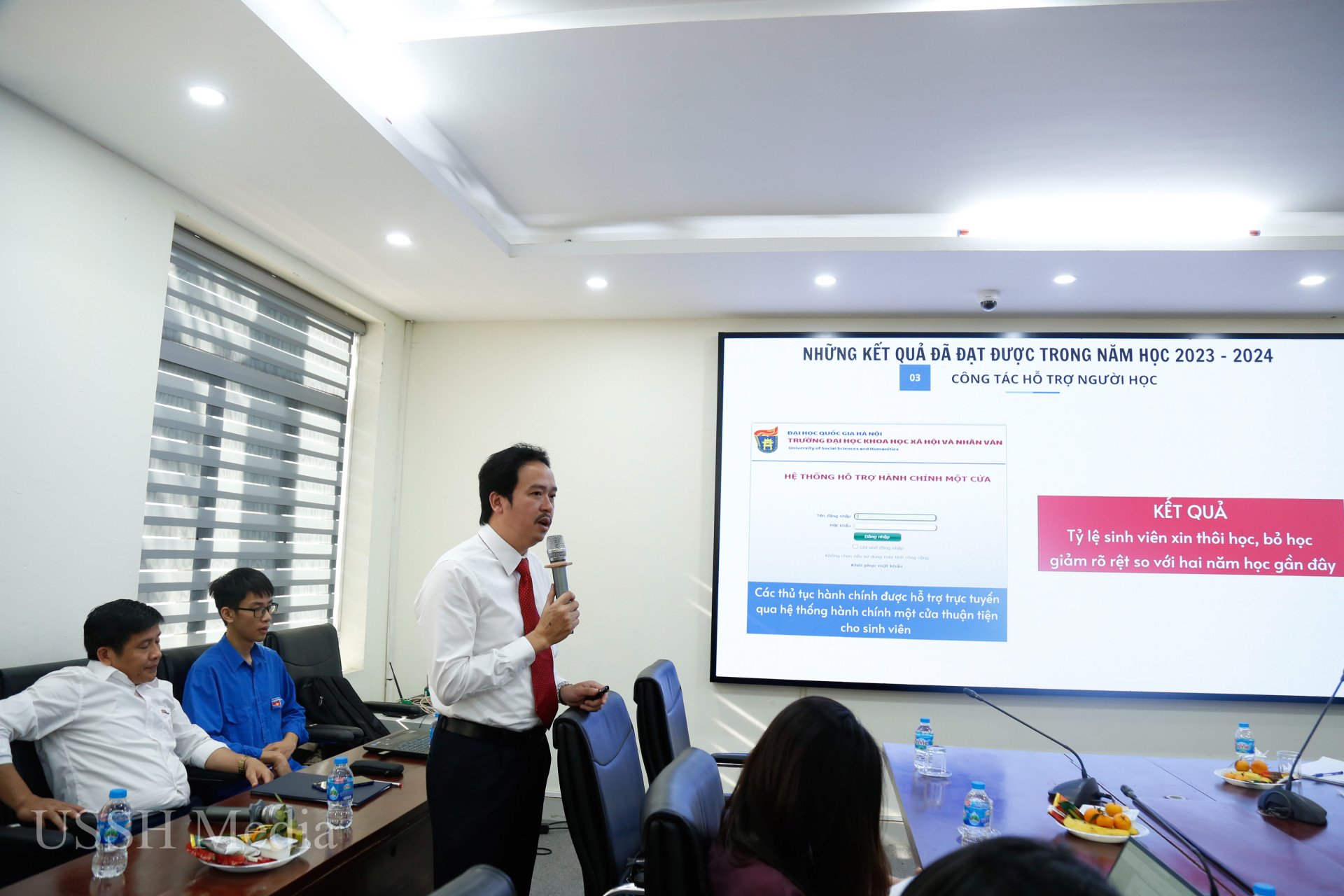
The conference received 10 comments from participating delegates, all of whom agreed with the results, directions, and solutions presented in the report. Furthermore, based on their practical experience in implementation at their respective units, the delegates openly shared many lessons learned and proposed several solutions.
Associate Professor Dr. Do Van Hung (Head of the Information and Library Science Department) shared his experience on the Department's "journey of ups and downs": "From a very difficult enrollment period (only about 50 students per cohort) to recent years, the Information and Library Science Department has consistently met and exceeded its targets (an average of about 150-160 students enrolling) and is among the top majors with relatively high admission scores. In addition, the dropout rate has also decreased significantly. This journey can be summarized in a simple formula consisting of 2D (Develop, Dedicate) and 4C (Connect, Captivate, Care, Commune). In my opinion, for student care to be successful, we must act with caution, thoughtfulness, and dedication so that each teacher becomes a friend who understands, advises, supports, and shares with students the difficulties in their studies and lives. All staff in the Information and Library Science Department are instilled with the spirit of striving to build a school that is not just a place for students to learn." "We not only learn and develop, but we also get to be listened to, appreciated, and empowered."
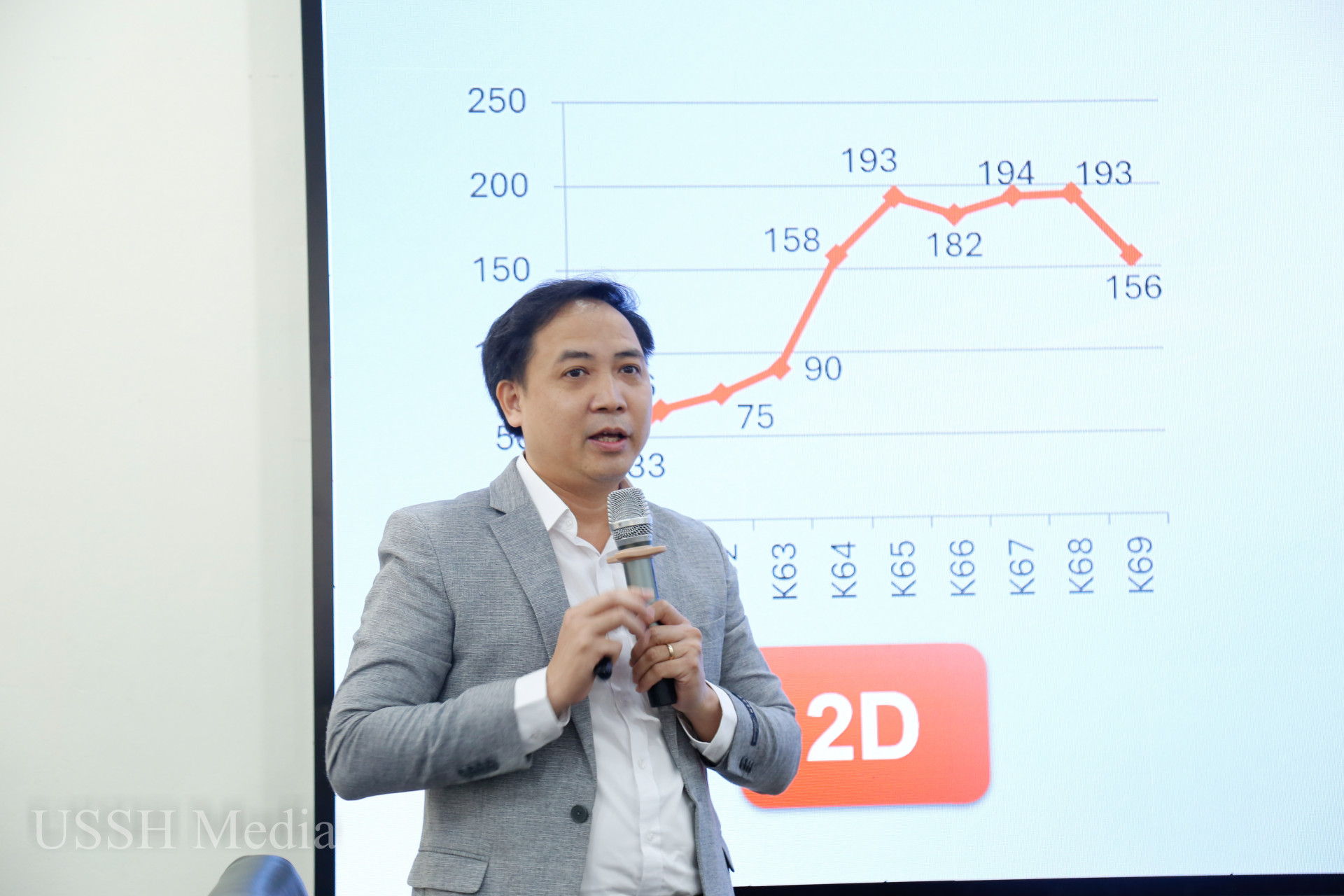
From the perspective of a basic science training unit, Dr. Pham Hoang Giang (Head of the Philosophy Department) shared solutions for classifying and individualizing learners in order to provide appropriate and effective support and guidance. “For talented, capable, and passionate students, care, guidance, and support should be provided from the moment they enter the university, not only during their studies but also after graduation and entering the workforce. This is not just about helping students complete their studies, but also about training experts in a highly specialized field like philosophy. In addition, regular seminars and thematic activities should be organized so that students understand the practical applications of their field of study in many areas of life today, proactively identifying career paths that suit them, rather than being limited to professions directly related to their field of study. Increased field trips and extracurricular activities should be organized to create beneficial opportunities for students to further connect with their field, faculty, teachers, and peers.”
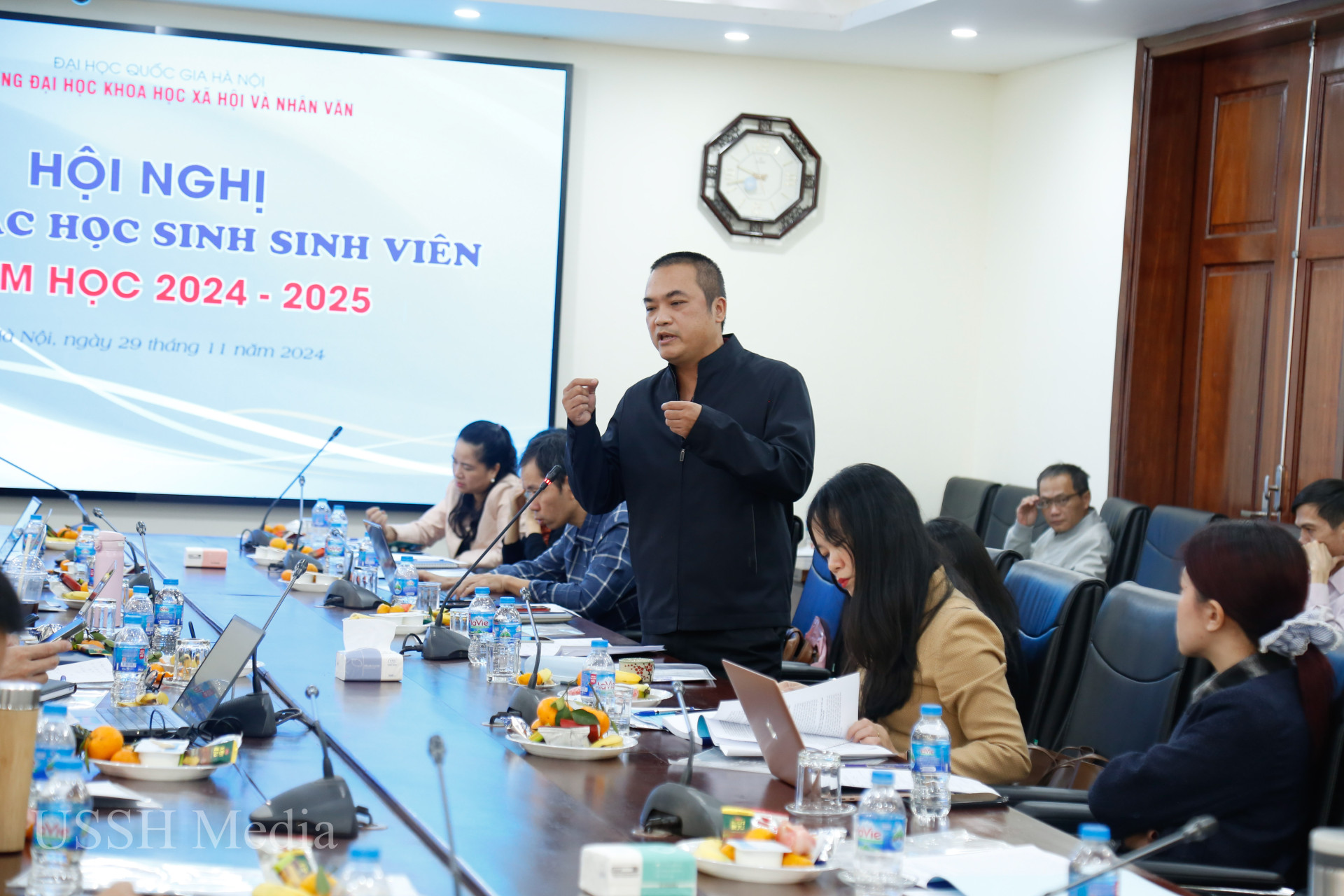
Dr. Nguyen Thi Kim Chi (Deputy Head of the Faculty of Management Sciences), with her practical experience as an expert in human resource management, analyzed the significant gap between employer demand and the actual capabilities of graduates. Meanwhile, the percentage of students finding suitable jobs after graduation is a crucial criterion for attracting students. Dr. Kim Chi proposed that career counseling activities should be organized more frequently and effectively in the future, equipping students with in-depth knowledge and proficient skills so that they are sought after by businesses as soon as they graduate, instead of struggling to find jobs as they do now. Simultaneously, a network of alumni and employers should be established throughout the university to share resources, better exploit job opportunities, and expand practical internship opportunities for students.
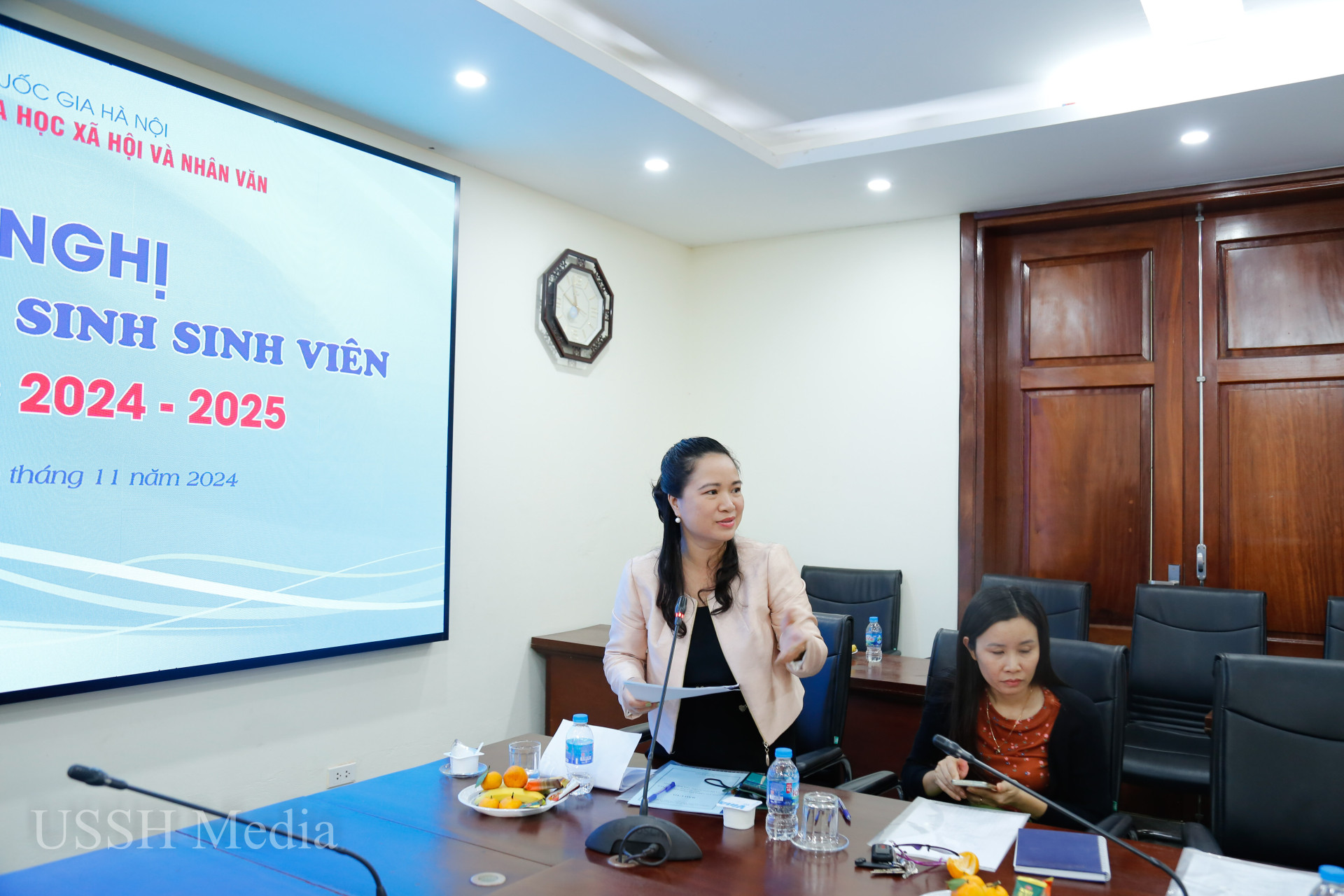
Dr. Le Thi Thanh Tam (Head of the Department of Vietnamese Studies and Vietnamese Language) proposed solutions to improve the quality of care for international students and trainees: Currently, on average, the University welcomes more than 1,000 international students and trainees annually for study and exchange. They are the bridge that spreads the values and brand of the University of Social Sciences and Humanities and enhances its position internationally. Therefore, the University needs a specific mechanism and policy to care for and treat international students. The University should have a focal point responsible for managing and caring for international students to ensure that activities are implemented professionally, efficiently, and more effectively with higher-level agencies (Vietnam National University, Hanoi, Ministry of Education and Training).
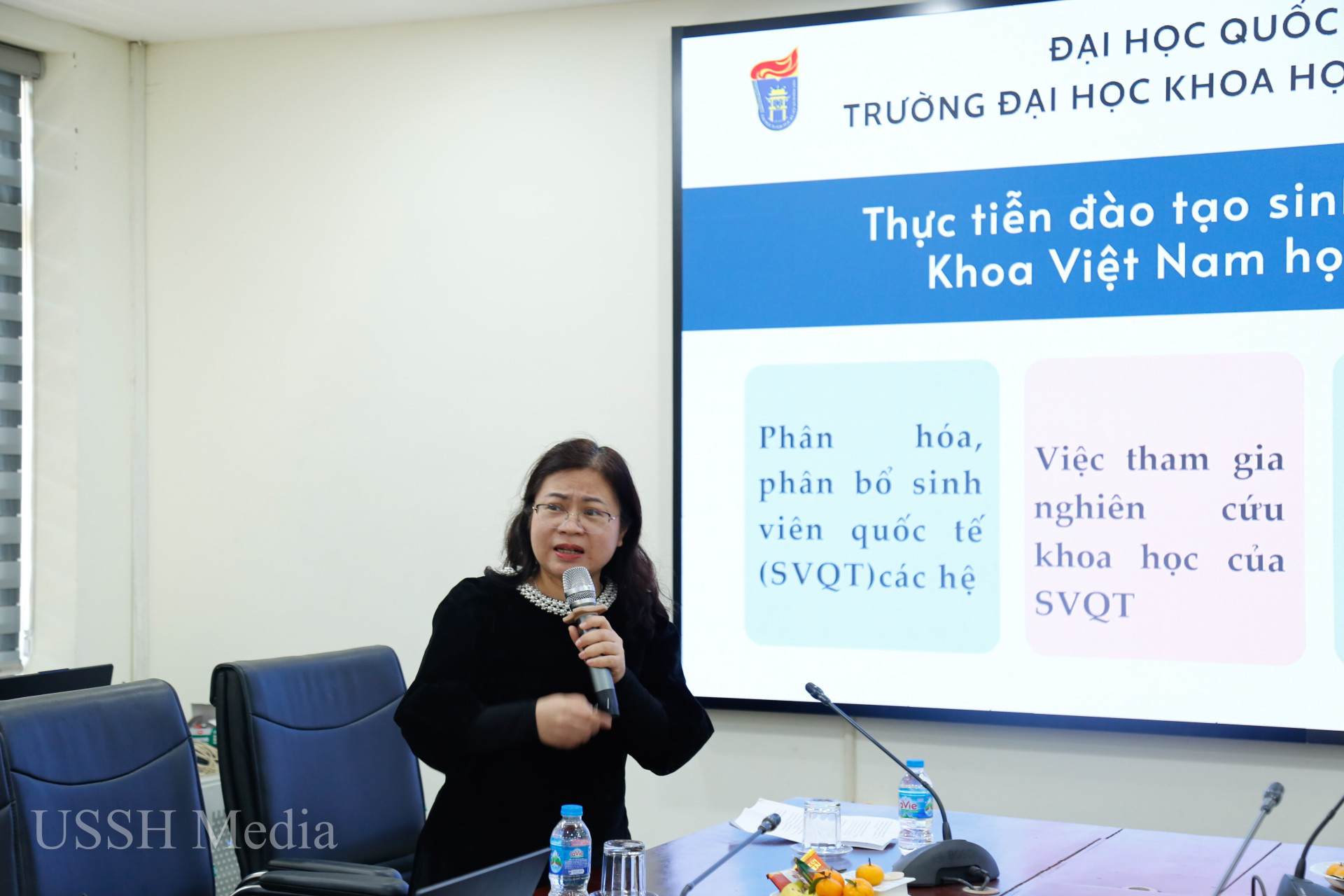
Dr. Pham Huy Cuong (Director of the Training Quality Assurance Center): To have specific and effective solutions, the operational direction for the 2024-2025 academic year report should include a deeper analysis of each specific group of learners: high school students, undergraduate students, postgraduate students, international students, etc., because each group has its own unique characteristics, so the care and support work also requires specific solutions.
Dr. Dao Minh Quan (Director of the Center for Communication and Information Technology) emphasized the need to strengthen communication efforts so that all students understand the training regulations, fulfilling their obligations correctly while also maximizing their rights during their time studying at the school.
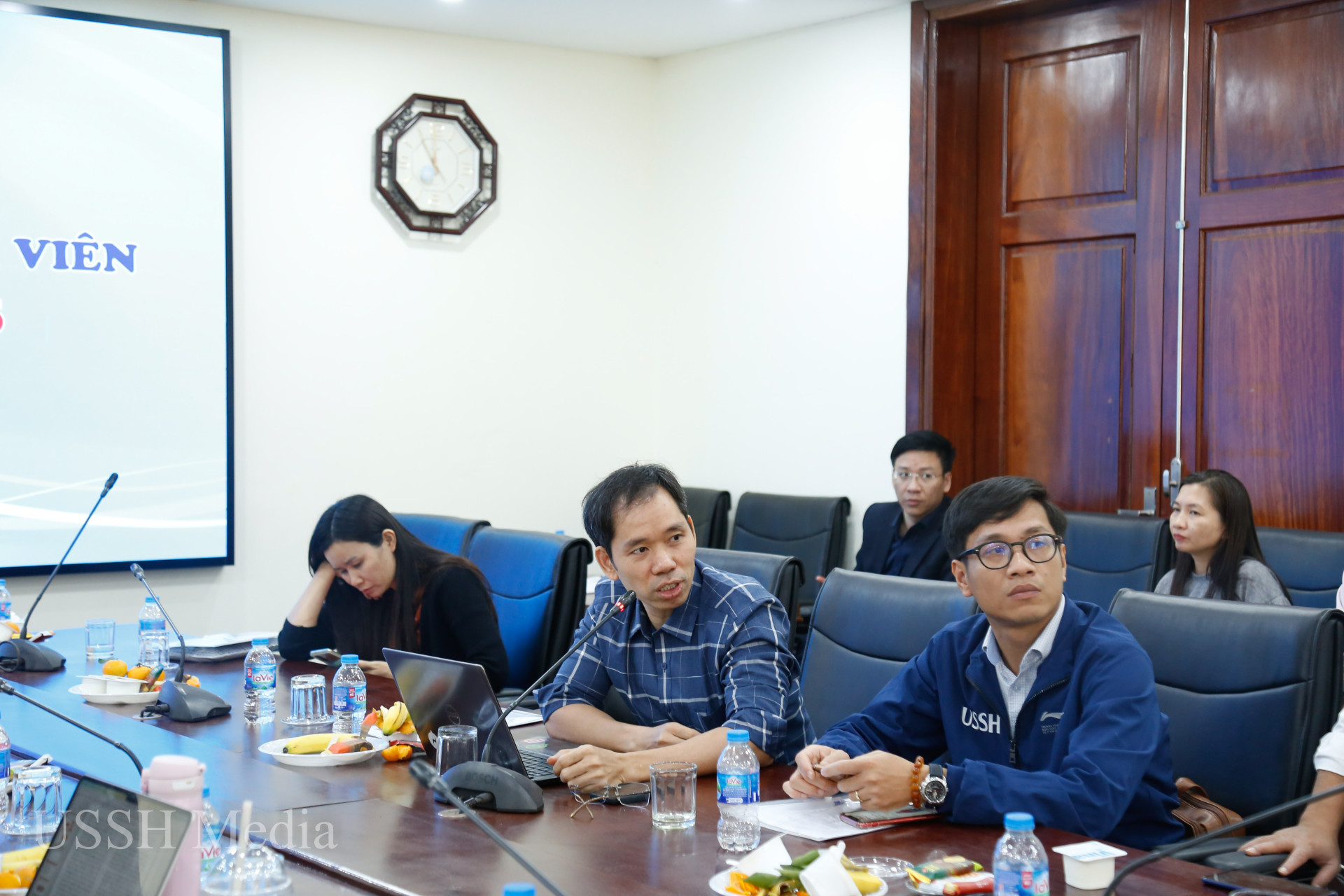
At the conclusion of the Conference, the representative of the University's leadership, Assoc. Prof. Dr. Dang Thi Thu Huong, acknowledged and highly appreciated the heartfelt contributions, specific and feasible proposals from the training units and functional departments. To contribute to improving the effectiveness and quality of student affairs, and to contribute to the overall achievements celebrating the 80th anniversary of the tradition and the 30th anniversary of the establishment of the University of Social Sciences and Humanities in 2025, Vice Rector Dang Thi Thu Huong emphasized several key points:
- The Political and Student Affairs Department will compile and review relevant documents on student affairs to ensure consistency, uniformity, and professionalism, maximizing the rights of students while providing the best possible support for the staff responsible for this area.
- Promote the application of information technology in receiving and processing administrative procedures and organizing activities to suit learners who are digital citizens; strengthen communication efforts to ensure that all learners at all levels and in all programs understand their rights and obligations while studying at the school.
- Strengthening political and ideological education, providing comprehensive care for the physical and mental health of students, with a focus on maximizing the use of scholarships and support, connecting students with career guidance and job opportunities.
- Care and support services need to encompass all learners, including domestic and international students, postgraduate students, and students pursuing dual degrees, etc. However, individualized grouping of learners is necessary to develop appropriate care solutions.
- Strengthen the connection between functional departments and training units to ensure smooth, consistent operation and timely, effective support for learners.
“To ensure the continued success of student care and support, the School's leadership hopes to continue receiving the cooperation and joint efforts of all faculty and staff. Not only the staff in functional departments and student affairs assistants in the faculties, but all the faculty and staff of the School have contributed, are contributing, and will continue to contribute to student care and support. Each teacher is a brand ambassador, presenting to the students an image of a humane, professional, effective, yet friendly, approachable, and caring institution.”
